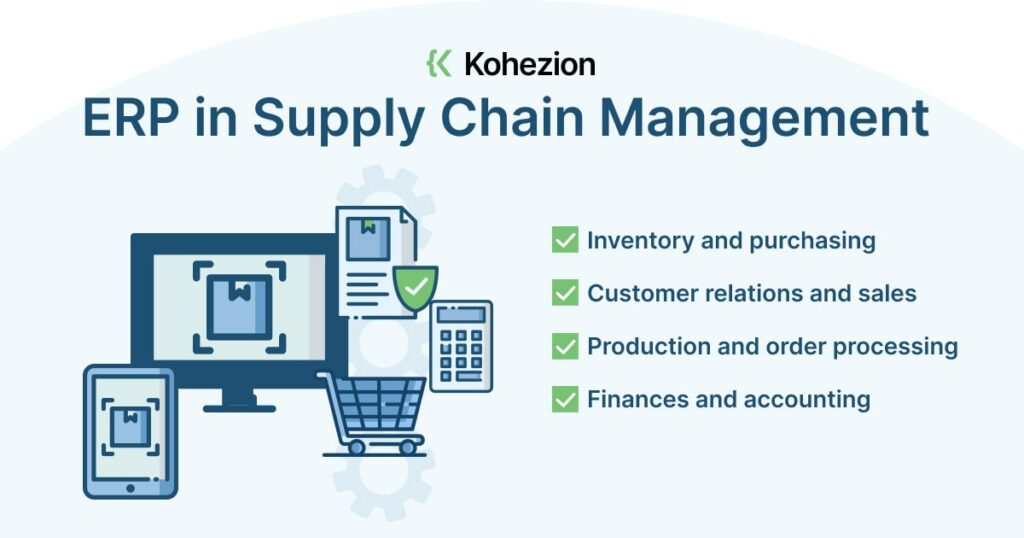In today’s fast-paced business environment, effective supply chain management is crucial for maintaining a competitive edge. Enterprises are increasingly turning to Enterprise Resource Planning (ERP) software to streamline their supply chain processes and achieve greater efficiency. Here’s why ERP software is critical for supply chain management and how it can transform your business operations.
1. Integrated Information System
One of the primary benefits of ERP software is its ability to integrate information across various departments. In supply chain management, this means having a unified view of data related to inventory, procurement, production, and distribution. By centralizing information, ERP systems eliminate data silos and improve communication between departments, leading to better decision-making and more efficient operations.
2. Enhanced Visibility and Tracking
ERP software provides real-time visibility into the entire supply chain. This includes tracking inventory levels, monitoring order statuses, and overseeing supplier performance. With this level of visibility, businesses can quickly identify and address issues such as stock shortages or delays, ensuring that they meet customer demands promptly and effectively.
3. Improved Demand Forecasting
Accurate demand forecasting is essential for effective supply chain management. ERP systems use historical data and advanced analytics to predict future demand patterns. This helps businesses plan their inventory and production schedules more accurately, reducing the risk of overstocking or stockouts. By aligning production and procurement with actual demand, companies can minimize waste and optimize their resources.
4. Optimized Inventory Management
Efficient inventory management is a cornerstone of a successful supply chain. ERP software automates inventory tracking, replenishment, and management processes. This ensures that businesses maintain optimal inventory levels, reduce carrying costs, and improve order fulfillment rates. Additionally, ERP systems can help companies implement just-in-time inventory strategies, further enhancing efficiency.
5. Streamlined Procurement Processes
Procurement is a critical component of supply chain management. ERP systems streamline the procurement process by automating purchase orders, supplier management, and contract administration. This reduces manual errors, speeds up procurement cycles, and ensures that businesses secure the best terms and prices from their suppliers. Automated procurement processes also enable better tracking of expenses and supplier performance.
6. Enhanced Collaboration with Suppliers
ERP software facilitates better collaboration with suppliers by providing a platform for sharing information and coordinating activities. Through ERP systems, businesses can communicate directly with suppliers, share forecasts and demand plans, and manage orders more effectively. This improved collaboration helps build stronger supplier relationships and ensures a more responsive and agile supply chain.
7. Regulatory Compliance and Risk Management
Compliance with regulatory requirements is essential in supply chain management. ERP software helps businesses manage and document compliance with industry regulations, such as those related to product quality, safety, and environmental standards. Additionally, ERP systems can identify and mitigate potential risks by providing insights into supply chain vulnerabilities and enabling proactive risk management strategies.
8. Cost Reduction and Efficiency
By automating and optimizing various supply chain processes, ERP software contributes to cost reduction and increased efficiency. Automation reduces manual tasks, minimizes errors, and speeds up processes, leading to lower operational costs. Furthermore, improved visibility and data-driven insights enable businesses to make informed decisions that enhance overall supply chain performance and profitability.
9. Scalability and Flexibility
As businesses grow and evolve, their supply chain needs change. ERP software offers scalability and flexibility to accommodate these changes. Whether expanding into new markets, adding new products, or increasing production capacity, ERP systems can adapt to evolving requirements and support business growth.
10. Data-Driven Insights and Reporting
ERP systems provide powerful analytics and reporting capabilities that enable businesses to gain valuable insights into their supply chain operations. Customizable reports and dashboards allow companies to monitor key performance indicators (KPIs), analyze trends, and make data-driven decisions. These insights help identify areas for improvement and drive continuous enhancement of supply chain processes.
Conclusion
ERP software plays a pivotal role in modern supply chain management by providing integrated, real-time data, optimizing processes, and enhancing collaboration. By leveraging ERP systems, businesses can achieve greater efficiency, reduce costs, and improve overall supply chain performance. As the complexity of global supply chains continues to grow, investing in robust ERP software is more important than ever for staying competitive and achieving long-term success.
